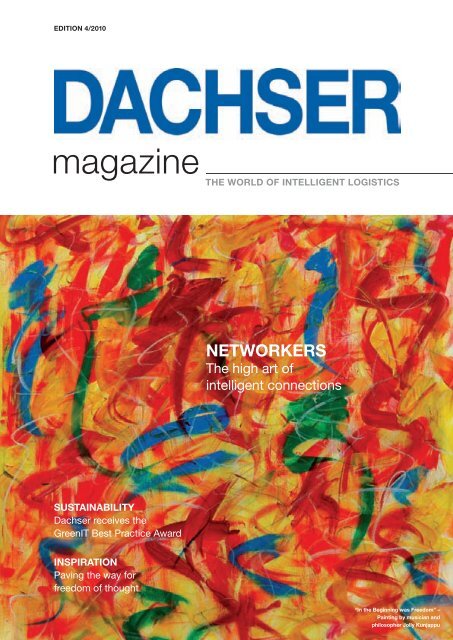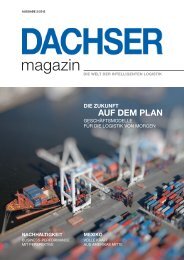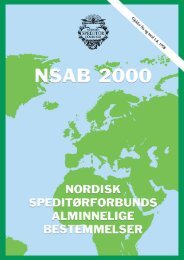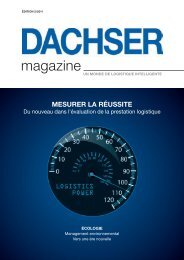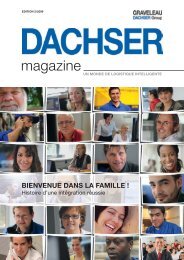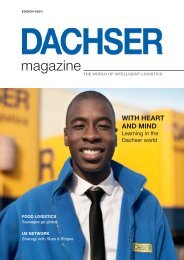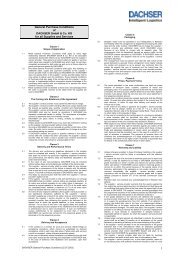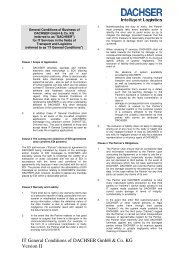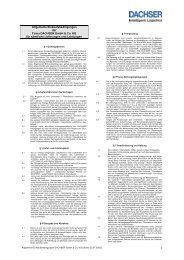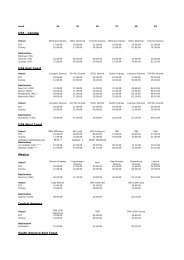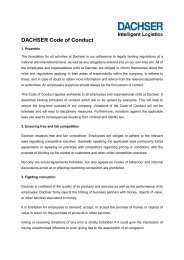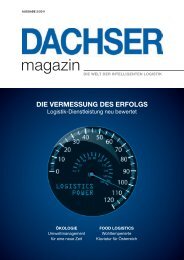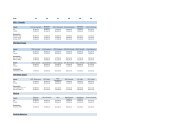NETWORKERS - dachser.sk
NETWORKERS - dachser.sk
NETWORKERS - dachser.sk
You also want an ePaper? Increase the reach of your titles
YUMPU automatically turns print PDFs into web optimized ePapers that Google loves.
EDITION 4/2010<br />
magazine<br />
SUSTAINABILITY<br />
Dachser receives the<br />
GreenIT Best Practice Award<br />
INSPIRATION<br />
Paving the way for<br />
freedom of thought<br />
THE WORLD OF INTELLIGENT LOGISTICS<br />
<strong>NETWORKERS</strong><br />
The high art of<br />
intelligent connections<br />
“In the Beginning was Freedom” –<br />
Painting by musician and<br />
philosopher Jolly Kunjappu
SNAPSHOT<br />
“To go somewhere,<br />
you must have a destination –<br />
and get started.”<br />
Globetrotter Michael Martin has been<br />
travelling the world’s last white spots for<br />
the past 30 years. It all started when as<br />
a schoolboy he undertook a moped tour<br />
of Morocco; nowadays he criss-crosses<br />
the world by motorbike, camel and dogsled,<br />
in pursuit of pictures and stories for his<br />
lectures, books and films.<br />
F<br />
02 DACHSER magazine<br />
www.michael-martin.de
FORUM<br />
People and markets: 04<br />
Air & Sea Logistics for global markets,<br />
truck market in flux and<br />
Dachser’s new platform in Copenhagen<br />
Dachser face-to-face: Paving the<br />
way for freedom of thought –<br />
Bernhard Simon meets Jolly Kunjappu 08<br />
NETWORK<br />
United Kingdom: A kingdom<br />
for integrated logistics 10<br />
COMPETENCE<br />
Sustainability: GreenIT Award<br />
for Dachser IT systems 12<br />
Social responsibility: How education<br />
in India creates a better future 13<br />
History: Around the world in 80 years –<br />
A success story with prospects 20<br />
COVER STORY<br />
Network competence:<br />
Growing with the challenges 14<br />
Co-authors wanted:<br />
The Dachser serial 23<br />
F Our DACHSER<br />
eLetter is packed with even<br />
more information.<br />
To find out more, visit:<br />
www.<strong>dachser</strong>.com/eletter-en<br />
10<br />
13<br />
14<br />
20<br />
CONTENTS<br />
Imprint<br />
Published by: Dachser GmbH & Co. KG, Memminger Str. 140, 87439 Kempten, Germany, Internet: www.<strong>dachser</strong>.com Overall responsibility: Dr Andreas Froschmayer Editor-in-chief:<br />
Jörn Erdmann, Tel.: +49 831 5916-1421, Fax: +49 831 5916-8-1421, e-mail: joern.erdmann@<strong>dachser</strong>.com Editors: Daniela Himmel, Martin Neft, Aljoscha Kertesz Publisher: BurdaYukom<br />
Publishing GmbH, Konrad-Zuse-Platz 11, 81829 Munich, Germany, Tel.: +49 89 30620-0, Fax: -100 Managing director: Dr-Ing. Christian Fill Project manager BurdaYukom: Marcus<br />
Schick Design: Ralph Zimmermann Photos: all photos Dachser except Jörg Reuther (p. 2), age-fotostock/LOOK (pp. 3, 10), fotolia (p. 11), iStock (pp. 4, 5, 11), Robert Martin (p. 12),<br />
Thorsten Jochim (pp. 16–18), HPKristensen (pp. 14–18), Illustration: Ralph Zimmermann (p. 9) Printer: AZ Druck und Datentechnik GmbH, 87437 Kempten, Germany Circulation:<br />
38,000/51st volume Publication: 4 x per year Languages: German, English, French. The DACHSER magazine is printed on LuxoSatin paper which meets the PEFC standards for sustainable<br />
forest management.<br />
DACHSER magazine 03
FORUM: PEOPLE & MARKETS<br />
Market development<br />
Growing with our<br />
customers<br />
The crisis as an opportunity: Thomas Reuter, managing director<br />
of Dachser Air & Sea Logistics, talks about how especially in times of crisis<br />
customer-oriented logistics brings markets closer together.<br />
Mr Reuter, how did the crisis<br />
impact the air and sea freight<br />
market?<br />
Last year, we experienced the<br />
worst recession since the Second<br />
World War. This also had<br />
a severe impact on international<br />
goods flows in our increasingly<br />
globalized markets.<br />
While air freight carriers had Thomas Reuter<br />
to absorb losses to the tune<br />
of some ten billion US dollars, shipping lines<br />
suffered shortfalls of double that amount.<br />
How did Dachser manage to position itself<br />
in this situation?<br />
Dachser Air & Sea Logistics bore up relatively<br />
well. We had to cushion a drop in the volume<br />
of consignments of a moderate five percent and<br />
losses in terms of container TEUs (Twentyfoot<br />
Equivalent Units) of around four percent.<br />
We thus performed significantly better than<br />
the market as a whole.<br />
How come Dachser did better?<br />
We exercised cautious judgement and reduced<br />
expenses, while at the same stepping up<br />
04 DACHSER magazine<br />
our sales efforts. Furthermore,<br />
despite the crisis, we continued<br />
to expand our network. Last<br />
year, Dachser Air & Sea<br />
Logistics, among others,<br />
opened a national company in<br />
Bangladesh. We managed to<br />
boost new business above all in<br />
consumer electronics and the<br />
automotive sector, and while<br />
we weren’t able to fully recover<br />
losses from existing customers, we did<br />
manage to keep them within tolerable limits.<br />
We reported an overall drop in earnings, but<br />
we didn’t slip into the red like other companies.<br />
What do air and sea freight customers expect<br />
from a long-term, global perspective?<br />
The focus is always on a seamless transport<br />
system, full-coverage service and personal customer<br />
care. Close proximity to our customers<br />
helps us to establish an excellent market position.<br />
Our advantage is that across the Dachser<br />
network, entrepreneurs within the enterprise<br />
stand for “Intelligent Logistics” everywhere in<br />
the world. This means our customers will<br />
always find a reliable and competent local<br />
Air freight on an upswing<br />
Taking off after the crisis:<br />
air freight business picks up worldwide<br />
+28.4%<br />
+10.1%<br />
+21.7%<br />
Development from January to August 2010<br />
International<br />
freight<br />
Domestic freight<br />
worldwide<br />
Total<br />
Source: ACI<br />
partner wherever they are. In this, we believe in<br />
very open communication in which we address<br />
problems head on and work together with our<br />
customers to find solutions.<br />
What role does the global Dachser network<br />
play in all this?<br />
For Dachser’s ASL customers, being able to<br />
draw on one-stop logistics services nowadays<br />
plays an increasingly important role. When a<br />
consignment is dispatched from Asia or the US<br />
to a destination in Europe, customers need to<br />
know that Dachser’s logistics network will<br />
ensure a smooth transition from air and sea to<br />
overland freight services. This is what constitutes<br />
our USP.<br />
What goals are you focusing on for Dachser<br />
Air & Sea Logistics?<br />
We are aiming for new market shares, for example<br />
in consumer electronics and renewable<br />
energies. In this, we continue to target the rapidly<br />
growing markets in countries like China,<br />
India and Brazil. But even more important<br />
than market shares are value-driven growth<br />
and globally standardized production<br />
processes. That’s where our focus lies.
Air& Sea<br />
For the Alexander Maer<strong>sk</strong>, getting from A<br />
to B as quickly and as inexpensively as possible<br />
is not the only thing that counts. Sailing<br />
under the Danish flag, the container ship is<br />
just as intent on following an environmentally<br />
compatible course. Having retrofitted<br />
the vessel with an exhaust<br />
gas recirculation system, the<br />
shipping line AP Moeller-<br />
Maer<strong>sk</strong> and MAN Diesel<br />
have now realized one of the<br />
ambitious goals set by the<br />
Danish maritime initiative The<br />
Green Ship of the Future, launched<br />
in 2008. Together with 15 other business<br />
and scientific partners, their aim is to reduce<br />
carbon dioxide emissions by 30 percent and<br />
FORUM: PEOPLE & MARKETS<br />
Rotterdam<br />
New gateway to the world<br />
Dachser now offers worldwide sea freight services to and from the Netherlands<br />
via one of the world’s biggest ports. Together with its joint venture<br />
partner Seacon, Dachser’s Air & Sea Logistics business segment has opened<br />
a sea freight office in Waddinxveen near Rotterdam. Offering a complete<br />
package of overland, air and sea freight services, as well as warehousing<br />
solutions, the new facility opens a new gateway to Dachser’s European and<br />
global network.<br />
Shipping<br />
All signs point<br />
to green<br />
emissions of nitrogen oxides and sulphur<br />
oxides by as much as 90 percent. But time<br />
is short: the International Maritime Organization,<br />
IMO, has stipulated that shipping<br />
lines must reduce nitrogen emissions by 80<br />
percent by 2016. In their efforts to do so,<br />
developers are focusing their attention on the<br />
large two-stroke engines used on ocean-going<br />
container vessels and tankers. Thomas S.<br />
Knudsen, head of MAN Diesel’s Low Speed<br />
business unit, sees the Green Ship project<br />
as blazing a pioneering trail: “With ‘The<br />
Green Ship’ of the Future we are going a step<br />
beyond normal measures to halt climate<br />
change and protect the planet.”<br />
For more information, go to<br />
F www.greenship.org<br />
DACHSER magazine 05
FORUM: PEOPLE & MARKETS<br />
Truck market<br />
Breakdowns<br />
are unacceptable<br />
Right of way for efficiency: At the International Motor Show,<br />
IAA Commercial Vehicles, in Hanover at the end of September,<br />
manufacturers and fleet operators directed their focus on the “Total<br />
Costs of Ownership” (TCO) of a truck.<br />
“Drivers are interested above all in vehicle comfort, drivability<br />
and performance,” explains Ron Borsboom, director of product<br />
development at DAF Trucks in Eindhoven, the Netherlands.<br />
For product developers, fuel-efficiency and reducing CO 2 emissions<br />
are therefore currently the key issues. “More than anything, vehicles<br />
these days have to be reliable,” Borsboom says. “It is simply no<br />
longer acceptable for vehicles to break down.” The developers’<br />
planning is almost entirely dictated by legislation, with standards<br />
in Europe (EURO) and the USA<br />
(EPA) defining the framework. “15<br />
years from now we are aiming for<br />
a 97-percent reduction in nitrogen<br />
oxides and a 95-percent reduction<br />
in particulate matter. And all this<br />
with lower fuel consumption as well,”<br />
Borsboom adds.<br />
At the IAA, Georg Pachta-Reyhofen,<br />
CEO of MAN Commercial Vehicles,<br />
gave a small demonstration of this<br />
future. The spectacular Concept S<br />
vehicle study boasts an air drag coefficient<br />
of just 0.3, equalling the performance<br />
of modern passenger limos<br />
and saving up to 25 percent in fuel<br />
and CO 2.<br />
06 DACHSER magazine<br />
Right of way for trucks in Europe<br />
This is where the rubber hits the road: transport<br />
solutions by truck are gaining in importance<br />
Road Rail Waterway Figures in percent<br />
1990<br />
2005<br />
2030<br />
Hungary<br />
Man of the year:<br />
Engelbert Liegl<br />
A high-calibre jury has nominated Engelbert Liegl,<br />
managing director of Liegl & Dachser, “Man of the Year<br />
2010” among Hungarian forwarders.<br />
Every year, the logistics journal Navigátor appoints<br />
the “Man of the Year” on the Hungarian<br />
forwarding scene. In 2010, the prestigious award<br />
went to Austrian-born Engelbert Liegl. The<br />
44-year-old managing director of Liegl &<br />
Dachser follows 12 Hungarian award winners<br />
as the first non-Hungarian to be honoured<br />
by the high-calibre expert jury. The jury was<br />
especially impressed by Liegl’s achievements within the scope of<br />
the Liegl & Dachser joint venture launched in 1999, referring to<br />
the company’s outstanding dynamic development under his management<br />
during the past few years and the high quality and<br />
service standards associated with the brand. In its explanation, the<br />
jury pointed out that under the management of Engelbert Liegl,<br />
Liegl & Dachser had become a leading logistics provider in the<br />
Hungarian market and enjoyed a high level of brand recognition<br />
and respect throughout Europe. Even in the crisis year 2009, the<br />
jury concluded, Liegl & Dachser had continued along its path of<br />
growth and achieved excellent results, ranking fifth at national<br />
level in terms of revenue.<br />
58.4 27.9 13.7<br />
72.5 16.0 11.5<br />
74.4 15.0 9.6<br />
Source: EEA<br />
In brief<br />
Together with its Australian<br />
partner company Mainfreight<br />
and Korean Air, Dachser Air<br />
& Sea Logistics transported<br />
a glass plate measuring<br />
almost 14 metres by 3 metres<br />
destined for the external<br />
façade of a building in<br />
Sydney from Munich to<br />
Sydney in a spectacular feat<br />
of air freight logistics. This<br />
is the largest glass plate ever<br />
to be carried by air. Dachser<br />
had already set a record<br />
two years earlier when<br />
it transported glass plates<br />
of a similar size.
INTEGRATION<br />
Vive la chance<br />
Intelligent growth: this motto is<br />
also shared by Dachser France.<br />
As part of Graveleau’s ongoing<br />
integration into the worldwide<br />
Dachser network since 1999, the<br />
logistics provider is setting new<br />
milestones with the introduction of<br />
the swap body system in France<br />
and the opening of the new Euro-<br />
Eva-Maria Marcour<br />
hub in Clermont-Ferrand scheduled<br />
for August 2011. Eva-Maria<br />
Marcour, who with her team<br />
has accompanied the integration<br />
process since the outset, sees this<br />
development confidently: “We<br />
meanwhile have several thousand<br />
well-trained employees in 40<br />
branches across France. In 2011,<br />
five additional branches will receive<br />
training. The main language<br />
is French; the Domino IT system<br />
permits seamless processes within<br />
the European network, with<br />
connections to 750 different countries<br />
across Europe.” Since 2005,<br />
Dachser has been coordinating<br />
such integration measures within<br />
the scope of its “WIN” project,<br />
which in addition to France also<br />
encompasses Poland, Belgium,<br />
Portugal as well as the Maghreb.<br />
“With this,” Marcour says, “we<br />
are opening the door to new customers<br />
and markets.”<br />
Family and globalization<br />
receive high scores<br />
Young people in Germany value their family.<br />
This is one of the results from the 16th Shell<br />
Youth Study. The study reveals that more<br />
than three quarters (76 percent) of youths believe<br />
a family is essential to living a happy life.<br />
In times when the demands of school, training<br />
and first job are increasing, the majority of<br />
young people say they get support and<br />
emotional stability from their family. Over<br />
90 percent of young people have a good<br />
relationship to their parents. 84 percent<br />
of youth connect globalization with<br />
the ability to travel, study or work<br />
anywhere in the world. However,<br />
worldwide integration is also<br />
increasingly associated with<br />
economic prosperity. In 2006,<br />
in other words before the<br />
economic and financial crisis,<br />
only 37 percent made this<br />
link, with 53 percent in 2010. At the same time,<br />
however, globalization is also more frequently associated<br />
with environmental damage.<br />
Copenhagen<br />
Network hub<br />
FORUM: PEOPLE & MARKETS<br />
In September, Dachser<br />
celebrated the opening of<br />
its new Copenhagen logistics<br />
centre on a 70,000square-metre<br />
site in Hvidovre.<br />
The head office of<br />
Dachser Nordic A/S represents<br />
an investment of<br />
20 million euros and employs<br />
a staff of 95. The<br />
logistics centre has a 4,100square-metre<br />
transshipment hall for industrial goods with 41 loading bays. The administrative<br />
and technology building covers 3,000 square metres. “This investment will<br />
strengthen our presence in Denmark and Scandinavia. Our customers appreciate<br />
the combination of regional competence and a closely meshed pan-European logistics<br />
network with intercontinental connections,” says Dachser managing director<br />
Michael Schilling.<br />
DACHSER magazine 07
FORUM: DACHSER FACE-TO-FACE<br />
Bernhard Simon meets ...<br />
Jolly Kunjappu<br />
“It’s only Rock ‘n’ Roll” – this famous<br />
Rolling Stones’ hit featured guest musician<br />
Jolly Kunjappu. Here, the Indian musician,<br />
painter and philosopher speaks to Dachser<br />
management spokesman Bernhard<br />
Simon about how companies are inspired<br />
by emotions and enthusiasm.<br />
hh Mr Kunjappu, as an artist and philosopher,<br />
freedom of thought is your main<br />
theme. Why is it we often find it so hard<br />
to give free rein to our thoughts?<br />
Jolly Kunjappu: When we come into this<br />
world, we have no idea what freedom is all<br />
about. We simply act and don’t question it.<br />
Somewhere along the line that changes.<br />
After all, we don’t live in isolation, but<br />
in an environment determined by norms:<br />
within the family, in society, at the workplace.<br />
Discovering the inherent freedom we are<br />
born with is a long and difficult process.<br />
But it’s a necessary one, and one that can help<br />
us advance – both as individuals and as a<br />
society.<br />
Bernhard Simon: And also as companies.<br />
I’m often a<strong>sk</strong>ed what’s behind our name “Intelligent<br />
Logistics”. Can we actually talk<br />
about a company being intelligent? No. But<br />
because it’s made up of a large number of<br />
people, I can give them the freedom to think<br />
about themselves and others. This implies<br />
more than just doing a job well. Intelligence<br />
comes from doing it differently and making<br />
it distinguishable from others. It’s therefore<br />
08 DACHSER magazine<br />
important to continuously reconsider what<br />
freedoms we can create to enable the power<br />
of thought to be set free that will shape<br />
Dachser’s future.<br />
J. Kunjappu: People shouldn’t be inhibited<br />
in their freedom of expression. If they are<br />
afraid of being chastized for expressing<br />
their thoughts freely, they’ll stop doing it.<br />
Creativity and innovation can therefore only<br />
flourish in a liberal society. In totalitarian<br />
systems, this simply doesn’t work.<br />
Every individual bears self-responsibility. That goes<br />
hh for inspiration as well. The result is a multiplier effect –<br />
because inspiration is contagious Jolly Kunjappu<br />
hh Does freedom have a direction?<br />
B. Simon: Freedom always has the direction<br />
of achieving a shared goal. The adage “freedom<br />
is the freedom of the original mind” still<br />
applies. Therefore, I must direct my thoughts<br />
in such a way that I not only satisfy my own<br />
ego, but I also give the associational idea a<br />
chance to develop.<br />
J. Kunjappu: If I have taken a decision to<br />
work for a company, then my freedom must<br />
also bear fruit for that company. Only when<br />
every single member of staff, from the managing<br />
director down to the janitor, understands<br />
freedom this way can it become an<br />
active process.<br />
PERSONAL FILE<br />
Jolly Kunjappu<br />
is an entrepreneur, musician,<br />
painter and philosopher. Born in<br />
India, he came to Germany in 1970.<br />
The world-class percussionist<br />
received a golden “It’s only Rock<br />
‘n’ Roll” LP as a guest musician<br />
with the Rolling Stones and composed<br />
ballet music for renowned<br />
opera houses. His “Dancing to<br />
Freedom” painting on a fragment<br />
of the Berlin Wall is today a<br />
protected monument. The master<br />
of marketing and management<br />
shares his global experience as<br />
an inspiring performance speaker<br />
and coach.<br />
F<br />
www.kunjappu.com<br />
Bernhard Simon<br />
is spokesman for the Dachser<br />
management. The corporate<br />
culture of the internationally<br />
operating family enterprise focuses<br />
on its stakeholders and ongoing<br />
cross-cultural exchange as the<br />
lynchpins of successful market<br />
positioning.
hh Mr Kunjappu, to be successful companies<br />
need creativity, gratification and<br />
inspiration. How does one generate such<br />
a culture?<br />
J. Kunjappu: A company has to show an interest<br />
in the wellbeing of its employees. They<br />
need to be able to find their identity. The way<br />
to achieve this is through respect, recognition<br />
and trust. And the mission must be important<br />
enough to give each individual the feeling<br />
they are part of the overall development.<br />
hh No one can be a constant source of<br />
inspiration within the company. What<br />
about the daily grind, the normal routine...<br />
B. Simon: Of course not every day is the<br />
same. We have to take life as it comes.<br />
With all its ups and downs. It’s therefore just<br />
as important to find inspiration in the small<br />
everyday things. For example, by constantly<br />
cooperating with colleagues and staff on<br />
solutions that I might never have come up<br />
with on my own. It’s the small things, the<br />
continuous thought processes, that give rise<br />
to creativity and innovation, not the big,<br />
one-time events.<br />
J. Kunjappu: Some employees believe inspiration<br />
should come from the top. But that’s<br />
not the management’s main ta<strong>sk</strong>. Every individual<br />
bears self-responsibility. That goes for<br />
inspiration as well. The result is a multiplier<br />
effect – because inspiration is contagious.<br />
hh Does inspiration need its own communication<br />
culture?<br />
J. Kunjappu: Communication is decisive. In<br />
the past it was important that an employee<br />
did his job. Today, he not only has to do his<br />
job, he must also constantly help to define<br />
and develop the job profile. That has con-<br />
sequences: there is no work-life balance, only<br />
a life balance. Everything I do is part of my<br />
life and enriches me. One day this may be<br />
work, the next playing football or mountaineering.<br />
I don’t make such distinctions. I<br />
don’t like the whole “after-work” concept. The<br />
business before pleasure attitude gets us<br />
nowhere. No, I enjoy myself while I am working.<br />
And afterwards as well. Put the whole lot<br />
together and what you get is inspiration.<br />
B. Simon: Understanding each individual<br />
as an integral part of the company means you<br />
won’t get the desired results if you separate<br />
business from pleasure. At Dachser, our<br />
goal is to see everyone as the individuals they<br />
are. That’s part of our culture and the basis<br />
for our success. We therefore invest a great<br />
deal of energy in creating places and events<br />
to facilitate contacts and personal exchanges.<br />
This lays the foundation for decisions that<br />
we could never reason so holistically from<br />
the top down.<br />
hh Mr Kunjappu, you made music with<br />
the Rolling Stones, one of the most successful<br />
bands in the world. What can we<br />
learn from Mick Jagger and Co.?<br />
J. Kunjappu: The Rolling Stones have been<br />
making music for the past 45 years. And<br />
they’re unbeatable. They are still the number 1<br />
and the most highly paid band in the world.<br />
The secret of their success is relatively simple<br />
and can serve as a model for companies:<br />
Mick Jagger, Keith Richards and Co. have<br />
been a fantastic team for what feels like forever.<br />
As individuals, they couldn’t be more<br />
different, and yet nevertheless they are a perfect<br />
foil for one another. Lots of people can<br />
sing, but when Mick Jagger gets up on stage,<br />
he has an amazing presence; he radiates pas-<br />
Entrepreneurs also have to inspire<br />
hhenthusiasm. Especially when it comes to convincing<br />
people that today’s recipe for success may no longer<br />
work tomorrow Bernhard Simon<br />
FORUM: DACHSER FACE-TO-FACE<br />
sion, energy, confidence and assertiveness.<br />
He is pure enthusiasm and a perfect strategist.<br />
That’s what makes the difference.<br />
B. Simon: Entrepreneurs also have to inspire<br />
enthusiasm. Especially when it comes to<br />
convincing people that today’s recipe for success<br />
may no longer work tomorrow. We continuously<br />
have to change, even if the prospect<br />
fills us with dread. If Dachser hadn’t done<br />
this over the past 80 years, we wouldn’t be<br />
here today, and couldn’t meanwhile proudly<br />
claim to be the organizer of “Intelligent<br />
Logistics” worldwide.<br />
q<br />
Branding<br />
needs passion:<br />
Mick Jagger, Keith<br />
Richards & Co. are<br />
the living example<br />
Read about the success strategy<br />
that gets the Rolling Stones<br />
“enterprise” still filling stadiums today in<br />
the full-length interview at<br />
www.<strong>dachser</strong>.com/discussion<br />
DACHSER magazine 09
NETWORK: UNITED KINGDOM<br />
10 DACHSER magazine<br />
In the kingdom<br />
of global trade<br />
When it comes to success, the UK takes its<br />
cues from soccer and relies on the luck of the<br />
bold. As the country emerges from the crisis,<br />
it is getting ready for logistics’ finest hour.<br />
And some keen competition. Dachser has the<br />
winning line up.<br />
hWas the ball in or not? Geoff Hurst’s<br />
shot in the 1966 World Cup final<br />
against Germany bounced off the crossbar,<br />
hitting or just crossing the line. The referee<br />
gave the goal, paving England’s way to<br />
World Cup victory. Ever since then, Wembley<br />
Stadium has been synonymous with<br />
passion, determination and the luck of the<br />
bold. British virtues through and through.<br />
In 2003, the stadium was pulled down and<br />
two years later the new Wembley Arena<br />
opened its doors: twice as big, four times as<br />
Nick Lowe,<br />
Managing Director<br />
Dachser Ltd.<br />
high – predestined for new legends. For if<br />
there’s anything the Brits are more passionate<br />
about than their soccer, it’s their continuous<br />
reforms. And there have been plenty<br />
of those in the history of the Empire.<br />
Take, for example, the shift from an industrial<br />
society to one based on services. In the<br />
19th century, the notorious island fog was<br />
joined by black clouds of soot over Liverpool,<br />
Birmingham and Manchester. Heavy industry,<br />
the coal, iron and steel industries and<br />
textiles manufacturing were the archetypical<br />
VOICES<br />
“I associate the UK with beer,<br />
soccer, very black humour<br />
and driving on the ‘wrong’ side<br />
of the road.”<br />
Harri Märki, IT Coordinator, Dachser Regensdorf,<br />
Switzerland<br />
“The Greenwich Meridian doesn’t<br />
only divide the eastern and western<br />
longitudes. It’s also the starting<br />
point for the discovery of new<br />
horizons by James Cook, Robert<br />
Falcon Scott, the Beatles and<br />
Pink Floyd.”<br />
Dmitry Elokhov, Operational Director,<br />
Dachser Russia<br />
“When I think of the UK, I think of<br />
fish ‘n’ chips, St. Andrews Old Golf<br />
Course and superstars like David<br />
and Victoria Beckham.”<br />
Wanda Lam, Vertical Industries Business<br />
Development Manager, Dachser Greater China,<br />
Hong Kong<br />
In contract logistics we can offer<br />
hh considerably more than others. This is where<br />
a lot of potential for the future lies Nick Lowe
engines of industrialization for the whole of<br />
Europe. Globalization was still largely unheard<br />
of, although throughout the Empire<br />
with its Commonwealth it had already become<br />
a centuries-long reality. As a seafaring<br />
nation, England developed a prospering<br />
overseas market for British products and controlled<br />
international trade. This was followed<br />
in the 20th century by the long, slow decline<br />
of heavy industry. Other nations had caught<br />
up, the technological lead dwindled away.<br />
Time for change. The cradle of industrialization<br />
gradually became a nation of vendors.<br />
The services sector enjoyed steady<br />
growth and in the meantime accounts for<br />
73% of the gross domestic product, compared<br />
to just 12.4% for the manufacturing industry.<br />
Today, more than three quarters of the working<br />
population in the UK are employed in<br />
the services sector.<br />
This structural change has also impacted<br />
the logistics industry, which has long been an<br />
important sector of the British economy.<br />
Every year, 2.3 million employees in 200,000<br />
companies generate revenue in excess of<br />
107.3 billion euros. “Competition in our<br />
business is fierce“, confirms Nick Lowe,<br />
managing director of Dachser Ltd. “Especially<br />
in our core businesses, European<br />
Logistics and distribution within the UK,<br />
we are very well-positioned on the market.”<br />
The field of contract logistics is also being<br />
further developped. “Here we can offer considerably<br />
more than others. This is where a<br />
lot of potential for the future lies.”<br />
In flux: the UK is<br />
on the move<br />
The Kempten-based logistics provider has<br />
been active in the British market since<br />
1975 and is a driver of continuous change.<br />
In 1982, for example, a new facility was<br />
opened on the Brackmills Industrial Estate<br />
in Northampton. In 1999, the company responded<br />
to growing demand for external<br />
warehousing and value-added services by<br />
opening a new warehouse on the same industrial<br />
estate for contract logistics. This<br />
was followed in 2005 by the new branch<br />
in Dartford, just south of London, thus<br />
paving the way for sustained success.<br />
But, as in nearly every other branch of the<br />
economy, this success suddenly slipped out<br />
of sight at the end of 2008. With London<br />
being one of the world’s key financial marketplaces,<br />
the crisis on the financial markets<br />
and in the economy hit the UK harder than<br />
its European neighbours. Economic output<br />
in 2009 plummeted by five percent. While<br />
Dachser Ltd. cut costs during this lean spell,<br />
it did not reduce warehousing capacities or<br />
its staff count. “Our strategy was fully in<br />
line with the entire Dachser group,” Lowe<br />
says. “When the economy started to pick up<br />
again this year, we were therefore in an<br />
optimum position to implement our longterm<br />
growth plans.”<br />
Emerging from the crisis<br />
with a record<br />
Although the debt-ridden country is only<br />
slowly recovering from the adverse consequences<br />
of the crisis, Nick Lowe is already<br />
anticipating a record year for Dachser Ltd.<br />
“We are expecting shipments within Europe,<br />
as well as to and from North Africa, to be up<br />
by 22%. 140,000 tonnes and 305,000 shipments<br />
– that’s our best performance yet.” And<br />
that’s not even counting the assets from the<br />
Leach acquisition. Dachser took over the<br />
logistics and transport business of JA Leach<br />
Transport Ltd., based in Rochdale near<br />
Manchester, in April and is in the process<br />
of integrating it into its own network. This<br />
provides Dachser Ltd. with its own location<br />
in the north-west of England, which optimally<br />
complements the two branches in<br />
Dartford and Northampton.<br />
“The integration of the new location is fully<br />
under way. By January 2011, we are also expecting<br />
standardized IT systems to be up<br />
and running.” For Dachser country manager<br />
Lowe, the successful integration will have<br />
fully occurred once the staff, business part-<br />
NETWORK: UNITED KINGDOM<br />
SHORTHAND<br />
United Kingdom<br />
Geography: Covering an area of<br />
just under 245,000 square metres,<br />
the island nation is a union of the<br />
formerly independent countries<br />
of England, Scotland, Wales and<br />
Northern Ireland.<br />
Government: The UK is a parliamentary<br />
monarchy with<br />
Queen Elizabeth II as its head<br />
of state since 1952.<br />
Population: With around 60 million<br />
inhabitants, the UK is one of the top<br />
three most highly populated countries<br />
in the EU and is a founding member<br />
of NATO and the United Nations.<br />
Economy: In the crisis year 2009,<br />
economic performance plummeted<br />
by five percent. For 2010, moderate<br />
growth of up to 1.5 percent is<br />
forecast.<br />
ners and customers are all fully accommodated<br />
and comfortable within the Dachser<br />
world. The integration process is the ta<strong>sk</strong> of<br />
a project team, with support from the head<br />
office in Kempten as well as from other branches<br />
in the Dachser network. The timing appears<br />
to be auspicious. In the second quarter<br />
of this year, the British economy recorded its<br />
strongest growth in nine years. Between<br />
April and June, the gross domestic product<br />
increased by 1.2% compared to the previous<br />
quarter. This awakens renewed sporting ambitions.<br />
In the latest representative “Logistics<br />
Strategy Survey”, 237 interviewed entrepreneurs<br />
place “customer service” and the “search<br />
for alternative markets” right at the top of the<br />
to-do list. The signs of the times are pointing<br />
to change – just like at Wembley. K. Fink<br />
DACHSER magazine 11
COMPETENCE: SUSTAINABILITY<br />
Winning<br />
IT systems<br />
High distinction for sustainable<br />
and innovative IT: Dachser wins prestigious<br />
GreenIT Best Practice Award 2010.<br />
hIn early November, Dachser was invited<br />
to Berlin where it was awarded<br />
the “GreenIT Best Practice Award 2010”<br />
in the category “energy-efficient IT systems”.<br />
Dachser received the award for combining<br />
various different innovative concepts<br />
to produce a sustainable and effective overall<br />
solution:<br />
1. Energy-efficient<br />
data centre<br />
Dachser’s new data centre offers several innovations:<br />
In case of fire an argon fire<br />
protection system removes the oxygen from<br />
the air, not only saving supply energy. As<br />
the inert gas argon is in any case a normal<br />
component of the mixture of gases that we<br />
know as “air”, this has no adverse impact on<br />
the environment. In addition, the data centre<br />
12 DACHSER magazine<br />
At its new data centre, Dachser combines<br />
various different innovative concepts to produce<br />
a sustainable overall solution<br />
is only cooled to 24°C rather than the usual<br />
20°C, reducing energy consumption by<br />
15%. For high-performance servers the<br />
logistics provider uses water-cooled racks.<br />
The energy-optimized data centre is configured<br />
to have separate warm and cold aisles<br />
and was constructed with a 100cm-high<br />
raised floor with flow ducts, notice-ably<br />
improving cooling efficiency.<br />
2. Use of Network Clients<br />
(NCs)<br />
The data centre was only needed in the<br />
first place because when traditional work<br />
stations were replaced there was a move away<br />
from Personal Computers towards Network<br />
Clients. Today Dachser has around 7,000<br />
NCs in use. These compact devices only<br />
require a tenth of the energy consumed<br />
by a PC. This saves the company 920,000<br />
kWh of electricity and at the same time<br />
significantly reduces the amount of waste<br />
generated from electronic and electrical<br />
equipment.<br />
3. Use of waste heat for new<br />
head office building<br />
Thanks to two heat exchangers, the waste<br />
heat from the data centre is collected and<br />
used to heat the head office building completed<br />
in 2010. This contributes 300 kW,<br />
which is up to 50% of the energy required to<br />
heat the entire building. The remaining 50%<br />
is harvested by Dachser using geothermal<br />
probes. The result for the logistics provider is<br />
a reduction in its annual CO 2 emissions of<br />
144 tonnes and significant savings on the cost<br />
of heating from fossil fuels.<br />
“Sustainability is firmly enshrined in<br />
Dachser’s corporate values,” says Michael<br />
Schilling, managing director of European<br />
Network Management & Logistics Systems<br />
at Dachser. “By combining various<br />
different techniques we have been able to<br />
generate both environmental and economic<br />
benefits for the business, in the interests<br />
of sustainability,” says Stefan Selbach, manager<br />
of Dachser’s Information Technology<br />
division. W. Reinthaler<br />
Secretary of State Cornelia Rogall-Grothe,<br />
the German Government’s Commissioner for<br />
Information Technology, and Stefan Selbach,<br />
manager of Dachser’s Information Technology<br />
division, at the GreenIT award ceremony.
Giving children a future<br />
In the Indian state of Uttar Pradesh, Dachser<br />
plays an active role in education and sustainable<br />
development. Spokesman Bernhard Simon<br />
on encouraging people to develop self-initiative.<br />
hMr Simon, the first phase of the joint<br />
aid project sponsored by Dachser and<br />
terre des hommes has recently drawn to a<br />
close. Are you satisfied with the results so far?<br />
Our initial aim was to reduce the number of<br />
school dropouts in the 30 villages we support.<br />
This was way above the national average, especially<br />
among girls. That goal has been achieved.<br />
Many more than the originally envisaged 7,000<br />
children have so far successfully completed<br />
their schooling. Now it is a question of leveraging<br />
this education as a basis for sustainable<br />
development.<br />
What is the main challenge for the second<br />
phase of the project?<br />
We can only succeed in motivating today’s<br />
school-leavers, in turn, to encourage their own<br />
children to pursue their education for a better<br />
future if we can stabilize the emerging new social<br />
fabric. This is what we are now focusing on<br />
in the second phase, while at the same time promoting<br />
an awareness of the local environment.<br />
What does sustainability mean for the<br />
project?<br />
We have to accept that people who in the past<br />
have not had the opportunity to participate<br />
in prosperity are now also quite rightly entitled<br />
to claim a greater share of it, with all the<br />
resources and consumption of resources this<br />
implies. Our ta<strong>sk</strong> now is to smooth the way and<br />
to the best of our ability accompany this process<br />
with our knowledge about sustainable development.<br />
This is why, in addition to the social<br />
dimension, we are increasingly incorporating<br />
environmental aspects, for example energy<br />
supply or solar-powered light.<br />
How does the Indian aid project reflect<br />
Dachser’s philosophy?<br />
A mother from India once a<strong>sk</strong>ed me why we<br />
were supporting her village. I replied that 80<br />
years ago, my grandfather, Thomas Dachser,<br />
showed vital entrepreneurial self-initiative<br />
when he founded our company. His ambition<br />
at the time was to take his fate into his own<br />
hands and ensure that even in difficult situations,<br />
we should be able to feed our families and<br />
provide for their future. Bringing this certitude<br />
and this strength, which remain the driving<br />
forces of our company to this day, to India is<br />
what links Dachser and terre des hommes in<br />
this aid project.<br />
What event has most moved you on your<br />
project visits?<br />
Meeting the lady mayor of one of the villages,<br />
a very remarkable and courageous woman.<br />
Together with her husband, the former mayor,<br />
COMPETENCE: SOCIAL RESPONSIBILITY<br />
she had embraced politics in an effort to<br />
drive her country’s future forward. She was<br />
particularly committed to combating corruption<br />
and in the process had made many<br />
enemies. In one dispute that turned violent,<br />
her husband was stabbed. She had continued<br />
fighting for the cause, became mayor herself<br />
and smartly created structures to ensure the<br />
sustained development of her village. She<br />
became a role model throughout the region<br />
and beyond for what it is possible to achieve<br />
through dedication.<br />
INFO<br />
Targeted aid<br />
Dachser’s aid project in cooperation<br />
with the international children’s<br />
relief organization terre des<br />
hommes has guaranteed regular<br />
schooling for numerous children in<br />
Uttar Pradesh since 2005. To date,<br />
25 schools have been provided<br />
with educational materials and<br />
sanitary facilities. Two vocational<br />
training centres have also been<br />
set up, aimed at preparing 1,500<br />
girls and boys for a working life.<br />
The second phase of the project<br />
began in October 2010. It will run<br />
for five years, over which time<br />
Dachser will contribute a total of<br />
EUR 400,000.<br />
DACHSER magazine 13
COVER STORY<br />
14 DACHSER magazine<br />
Integrated in a worldwide<br />
network: Finn Skovbo<br />
Pedersen, managing director<br />
of Dachser Nordic A/S
At home<br />
in the network<br />
Dachser’s European network is growing. This goes for<br />
Scandinavia, too. Dachser Nordic A/S now benefits from the<br />
myriad opportunities a Europe-wide network presents.<br />
The three national companies have accepted the challenges<br />
of in-depth incorporation to enable them to offer their customers<br />
the added value of an integrated network.<br />
hComing home is a very special feeling.<br />
Family members who have to regain<br />
their footing at home after living and working<br />
abroad for many years know this feeling<br />
only too well. An element of this is also implicit<br />
in the continuous growth of Dachser’s<br />
European network over the past few years,<br />
which has been aimed at establishing optimal<br />
interaction, active exchange and mutual understanding.<br />
The path to achieve this has<br />
been smoothed by similarities rooted in our<br />
respective background, mentality and goal<br />
COVER STORY<br />
orientation. This has given rise to the steady<br />
integration of a number of forwarding companies<br />
into Dachser’s European network over<br />
the past ten years, most of them – like<br />
Dachser – family-owned companies. “We<br />
have entered a whole new world,” says �<br />
DACHSER magazine 15
COVER STORY<br />
In Scandinavia, new long trucks<br />
already have right of way<br />
The networkers from Dachser’s head office<br />
in Kempten: Thomas Schmalz, Jörg Herwig<br />
(front from left), with Christina Müller,<br />
Wolfgang Janda and Silvia Bauer (back from left)<br />
Dachser Nordic managing<br />
director Pedersen at<br />
the Copenhagen head office<br />
Finn Skovbo Pedersen, managing director<br />
of Dachser Nordic A/S, which incorporates<br />
the national companies in Denmark, Sweden<br />
and Norway. Up until five years ago, he was<br />
director of Haugsted, one of the oldest forwarding<br />
companies in Denmark. Dachser<br />
acquired 100% of the shares in the renowned<br />
family enterprise in March 2005. Back then,<br />
the Kempten-based company had already<br />
been active in the Danish market for several<br />
years. Haugsted brought 238 employees, 11<br />
locations in Denmark, Sweden and Norway<br />
and some 2,000 customers into the new<br />
venture. The move to Dachser catapulted the<br />
import and consolidated goods specialist<br />
to a new level of logistics. Haugsted became<br />
part of an internationally operating logistics<br />
provider with full-coverage systems freight<br />
services and state-of-the-art IT logistics.<br />
Nerve-racking transition<br />
Pedersen describes the run-up to the<br />
takeover as “pretty nerve-racking”. At the<br />
time, there was a fair amount of upheaval in<br />
the logistics sector. “Whenever one of our<br />
partners was bought out by a third party –<br />
In more and more<br />
hh logistics markets,<br />
a full-coverage, where possible<br />
seamless service for<br />
many countries is expected<br />
Prof. Peter Klaus<br />
which happened quite a lot – we quickly<br />
had to find someone to take their place or<br />
make sure we already had another partner up<br />
our sleeve,” Pedersen recalls and explains:<br />
“We struggled to ensure our customers stayed<br />
with us and didn’t go with the partner.”<br />
What’s more, the market was making ever<br />
higher demands on technology, including<br />
“Tracking & Tracing”, which would have<br />
forced Haugsted to make major investments.<br />
“A lot of companies,” Pedersen remembers,<br />
“wanted to take us over at the time.”<br />
But it was Dachser that proved to be the<br />
partner of choice. Above all because of its extensive<br />
European network. The Kemptenbased<br />
logistics provider had more than 750<br />
different national connections within Europe
on its books. Whether a delivery needed to<br />
be made from Denmark to Portugal, from<br />
Ireland to Bulgaria, or even from France<br />
to Estonia: “In all 28 countries, we follow<br />
standardized procedures that have been<br />
jointly approved,” stresses Wolfgang Janda,<br />
manager of the European Logistics Network<br />
Management/Production division at<br />
Dachser. “Our uniform IT system has been<br />
installed in 17 European countries.” The<br />
other countries work according to the same<br />
IT standards and are integrated via interfaces<br />
into the standardized data interchange.<br />
“The information flow runs in both directions,”<br />
Janda explains, enabling Tracking &<br />
Tracing data to be accessed from anywhere.<br />
“Wherever in Europe a customer places an<br />
order, the consignment is transported from<br />
customer to consignee. The respective data<br />
are transmitted to our data interchange<br />
centre in Kempten and from there to the<br />
receiving terminal.”<br />
A unique spirit<br />
These possibilities convinced Haugsted to<br />
look to its own future within this strong network.<br />
In a first step, a detailed status analysis<br />
paved the way. Next, bilateral teams developed<br />
a target concept. At Dachser, the rules<br />
for this integration process are clearly defined.<br />
It should take place within the scope of<br />
an intensive, honest dialogue between all<br />
stakeholders, with one coach never instructing<br />
more than three people at a time. The<br />
philosophy behind this is clear. It is not about<br />
imposing Dachser’s systems at all costs. This<br />
integration approach is appreciated in particular<br />
by family-run companies, where from<br />
experience mutual understanding plays an<br />
important role. Like this, Dachser sows the<br />
seed for the unique Dachser spirit, the<br />
Dachser DNA. A positive experience for all<br />
stakeholders was made in 1999 for example,<br />
with the partner integration in Hungary,<br />
followed in 2003 by a merger in Austria.<br />
In subsequent years, integration of the partner<br />
in Slovakia was on the agenda, in 2005<br />
in Denmark, Sweden and Norway, one<br />
year later in the Czech Republic and in 2009<br />
in Romania.<br />
Uniform rules<br />
“In more and more logistics markets – from<br />
groupage via CEP and numerous special<br />
markets – a full-coverage, where possible<br />
seamless service for many countries is<br />
INTERVIEW<br />
Managing complexity<br />
COVER STORY<br />
The network offers many opportunities. Jens Müller,<br />
Network Management Organization division manager<br />
at Dachser, talks about how high standards and<br />
clear rules create efficient logistics.<br />
What challenges does a pan-European network pose for a logistics<br />
provider’s organization?<br />
Those out in the lead in Europe need clear rules. Our homogenous structure<br />
gives us advantages over group companies and forwarding cooperations.<br />
With entargo and groupline, we can offer our customers standardized products.<br />
Uniform processes and streamlined quality management increase efficiency<br />
just as much as high building standards.<br />
What prerequisites must customers fulfil to enable them to reap the<br />
benefits of the network?<br />
One of the key factors is long-term partnerships: Customers should be open<br />
to innovative developments, especially in information logistics. This includes promoting<br />
transparency. Successful projects are based on trust.<br />
How will a cross-border flow of data change logistics processes in<br />
the future?<br />
Optimized data flows lead to additional synergies and – fully in line with the<br />
idea of sustainability – to better utilization of transport capacities. This does not<br />
prioritize making logistics faster, but more efficient. Concentrating on essentials<br />
makes complexity manageable. This stems the flood of data and directs it into<br />
the right channels.<br />
Under the lead management of Jens Müller, the teams headed by Ingo Müller,<br />
Thomas Jäger and Elmar Fünfer develop innovative and complex solutions within<br />
Dachser’s pan-European network.<br />
expected,” explains Peter Klaus, today a<br />
lecturer at Boston University and author of<br />
the definitive annual study “Top 100 in<br />
Logistics”. The academic, who in 2009 was<br />
admitted to the “Logistics Hall of Fame”,<br />
sees two reasons for this: one of them being<br />
the declining importance of political and<br />
language barriers in Europe and worldwide.<br />
The second is “the trend away from storing<br />
products in regional and national warehouses,<br />
in favour of central logistics centres”.<br />
Michael Schilling, managing director of<br />
Dachser’s European Network Management<br />
& Logistics Systems business unit, observes<br />
a similar trend. “An increasing number of<br />
customers manage their procurement logistics<br />
via our network,” Schilling says. �<br />
Dachser Nordic A/S’s new head office<br />
in Copenhagen, Denmark<br />
DACHSER magazine 17
COVER STORY<br />
18 DACHSER magazine<br />
Major customers with<br />
hh Europe-wide operations<br />
are looking for logistics providers<br />
with pan-European networks<br />
Michael Schilling, managing director of Dachser’s European<br />
Network Management & Logistics Systems business unit
Finn Skovbo Pedersen,<br />
managing director of<br />
Dachser Nordic A/S<br />
“Many major companies see this as a way<br />
of making their logistics processes leaner and<br />
concentrating them at a single point.” The<br />
consequence, he says, is that major Dachser<br />
customers with Europe-wide operations<br />
have fewer and fewer logistics managers in<br />
each individual country. “These customers<br />
are looking for logistics providers with pan-<br />
European networks.”<br />
Thinking outside the box<br />
In Denmark, one of the first network integration<br />
steps taken was the introduction of<br />
Dachser’s proprietary Domino transport<br />
management system, which is used in 17<br />
European countries and offers a high level<br />
of security and reliability. This makes communication<br />
problems between different systems<br />
a thing of the past. Another advantage<br />
is that Domino offers customers transparency<br />
from collection right through to shipment<br />
delivery. “Our employees had to completely<br />
change their way of thinking,” Pedersen says.<br />
Today, Dachser Denmark works according<br />
to exactly the same standards as the rest of the<br />
group. Whereas in the past Haugsted collected<br />
goods twice a week from each of its<br />
50 partners, they suddenly had to cope with<br />
a completely different line management.<br />
That had consequences. Haugsted’s partner<br />
network collapsed. Almost overnight, the<br />
50 partners had become competitors, because<br />
Dachser’s European network took over their<br />
ta<strong>sk</strong>s.<br />
The customer profile also changed radically.<br />
The Danes parted from customers in the<br />
field of long steel goods, which had been<br />
combined with Haugsted’s consolidated<br />
freight services. “It no longer fits in with<br />
Dachser’s groupage system,” Pedersen says.<br />
Haugsted’s export business also used to be<br />
weakly positioned. Today, Dachser Denmark<br />
delivers palletized goods for final customers<br />
to, among others, DIY stores across Europe.<br />
Famous Danish durable goods designer<br />
brands such as Bodom, Menu or prestigious<br />
Our employees had<br />
hh to completely change their<br />
way of thinking Finn Skovbo Pedersen<br />
Royal Copenhagen porcelain are transported<br />
by Dachser Europe-wide to the point of<br />
sale. Around one quarter of all Dachser<br />
Denmark’s deliveries are destined for Sweden<br />
and Norway. Many of the shipments are<br />
made up of Danfoss heating thermostats<br />
that are supplied to France and Spain.<br />
Five years after the extensive integration<br />
process, Pedersen takes stock: Dachser<br />
Denmark has meanwhile managed to build<br />
up a national network on a scale that hadn’t<br />
existed previously. Although a few of the<br />
238 staff members left the company in the<br />
early days, the workforce has in the meantime<br />
grown to 320. Two years ago, a terminal with<br />
an area of 4,300 square metres and 43 loading<br />
bays was opened in Kolding, Denmark –<br />
already a Dachser location before the integration.<br />
While five years ago the facility handled<br />
13,000 consignments per month, in the<br />
meantime that volume has jumped to 36,000.<br />
Moreover, in September a new terminal with<br />
an area of 4,200 square metres and 41 bays<br />
was inaugurated in Copenhagen. Here, too,<br />
the number of monthly consignments has<br />
risen from 8,000 five years ago to around<br />
27,000 today. In addition to Dachser Nordic’s<br />
administrative departments, the 3,000 square<br />
metres of office space also accommodates<br />
the Air & Sea Logistics business segment.<br />
And: “In terms of customer satisfaction, we<br />
are out there with the best,” Pedersen says<br />
enthusiastically.<br />
A favourable position<br />
with customers<br />
The standards practised at Dachser in Denmark<br />
since 2005 apply across the entire<br />
pan-European network – in the meantime<br />
28 countries including Serbia, Bosnia and<br />
Bulgaria. Three Eurohubs represent important<br />
nerve centres within the network from<br />
where markets in central, western and eastern<br />
Europe are served: in Überherrn/Germany<br />
since 2002, in Bratislava since 2008 and from<br />
July 2011 in Clermont-Ferrand/France (see<br />
COVER STORY<br />
On route to Europe: integration brings<br />
markets closer together<br />
also page 7). Dachser also operates 129 terminals<br />
of its own, as well as 101 partner locations<br />
in Europe, for example the family-run<br />
company Azkar in Spain and Fercam with<br />
more than 30 locations in Italy.<br />
“We have almost 6,000 of our own swap<br />
bodies and over 1,000 of our own trailers in<br />
operation across Europe,” Janda says, explaining<br />
further strengths of the pan-European<br />
network. Thanks to double-deck loading,<br />
the box vehicles provide a high degree of<br />
load security. This was one more reason that<br />
convinced the Danish family enterprise,<br />
Haugsted, to opt for integration into<br />
Dachser’s extensive European network and at<br />
the same time for a new entrepreneurial environment,<br />
thus paving the way to a positive<br />
future. “With increasing Europeanization<br />
and globalization,” says logistics expert Professor<br />
Peter Klaus, “companies able to offer<br />
high-quality and efficient international services<br />
without a doubt have greater development<br />
potential.” S. Machens<br />
DACHSER magazine 19
NETWORK: CORPORATE HISTORY<br />
Phileas Fogg was in a hurry.<br />
In Jules Verne’s novel, he<br />
travelled around the world in<br />
80 days. Dachser has followed<br />
the same route – but over<br />
a period of 80 years.<br />
Landmarks of success.<br />
20 DACHSER magazine<br />
Around the world<br />
in 80 years<br />
By separating boxes from trucks, Dachser<br />
paved the way to future-pointing logistics
h 15<br />
September 1950. Etienne Westling,<br />
aged 27, opens Dachser’s new<br />
export department in Kempten. His first<br />
order is to dispatch a parcel from Pfronten to<br />
Zurich. In the subsequent months, more and<br />
more international orders follow, with destinations<br />
in Sweden, the Netherlands, Belgium<br />
and the UK. In Germany, it’s the time of<br />
the “economic miracle”. The upswing is reflected<br />
in growing exports to countries<br />
around the world. Dachser’s journey round<br />
the world begins.<br />
By 1953, Westling already has enough work<br />
to keep a staff of 12 busy. Not only is the<br />
size of the department increasing, but so are<br />
tonnages. For example, 3,000 tonnes of steel<br />
are transported from southern Germany to<br />
Finland, or church bells from Kempten to<br />
Hamburg, and from there by ship to Rio<br />
de Janeiro. It’s during this boom period<br />
that intercontinental business also takes off.<br />
In 1951, Dachser is the first air freight forwarder<br />
to open a 25-square-metre office at<br />
Munich Riem airport. This is soon followed<br />
through Dachser’s newly established air<br />
transport service by a second office in<br />
Stuttgart in 1954 and a third in Frankfurt a<br />
year later.<br />
Containers conquer the world<br />
Transport services increasingly determine the<br />
pulse of the economy. Two giant, unassuming<br />
metal boxes change the world: swap bodies<br />
and containers. At the end of the sixties,<br />
Dachser develops the swap body system featuring<br />
removable transport units attached to<br />
trailer chassis, and up to 1971 introduces it<br />
across the company. This makes it possible to<br />
speed up and lower the cost of transport operations.<br />
Separating boxes from trucks is<br />
almost as important for overland transport<br />
as the introduction of sea freight containers<br />
is in shipping. Their triumphant success begins<br />
in Germany on 6 May 1966, when the<br />
first container ships dock at the port of<br />
Bremen and, soon after, in Hamburg. Just<br />
one year later, almost all Dachser branches<br />
operate regular container freight services<br />
to and from Hamburg. From now on, the<br />
destination is the world. Many shipments are<br />
destined for the US, where on 1 January<br />
1970, Dachser opens its first office in New<br />
York. One by one, new branches are established<br />
across the United States. Today, there<br />
are ten in all. Development of the American<br />
market is still ongoing. In 2010, Dachser<br />
Father<br />
of success:<br />
Thomas Dachser<br />
is present with 15 locations of its own in<br />
Brazil, Mexico and Chile. Swap bodies and<br />
sea freight containers continue to spur the<br />
markets today – both in Europe and overseas.<br />
Thus in 2010 Dachser also introduces its<br />
swap body system in France, where it has<br />
been little used to date, giving one of<br />
Europe’s key logistics markets a powerful impulse.<br />
Globalization box<br />
According to experts, the containerization of<br />
international goods flows has not yet peaked.<br />
Container ships are becoming bigger and<br />
bigger, port basins deeper, demands for onward<br />
forwarding of consignments higher.<br />
Globalization without containers is unthink-<br />
Flexibility is everything: swap bodies<br />
and containers are the way forward<br />
NETWORK: CORPORATE HISTORY<br />
able. They are the medium of globalization –<br />
about which French economist Alain Minc<br />
comments in an interview with the German<br />
news weekly “DIE ZEIT”: “Globalization<br />
is to our economies what gravity is to physics.<br />
You can’t be for or against it – you simply<br />
have to live with it”. Containers have not<br />
only brought about a sea change in oceangoing<br />
and overland transport culture, they<br />
are also instrumental in the emergence of a<br />
worldwide system of production and consumption.<br />
This fact is underscored by<br />
Alexander Klose, author of the book “The<br />
Container Principle”: “They are the heart of<br />
logistics, which since the 19th century has<br />
become integral to all areas of society”. Today,<br />
Dachser’s Air & Sea Logistics business segment<br />
(established in 1995) currently has a<br />
staff of nearly 3,000 who handle everything<br />
that needs to be moved by air and sea.<br />
Trust in the network<br />
On its journey round the world, Dachser by<br />
and by establishes its own locations in Europe<br />
and later in other regions of the �<br />
DACHSER magazine 21
NETWORK: CORPORATE HISTORY<br />
world. The secret of success lies in leveraging<br />
the knowledge of experts in the respective<br />
countries to quickly understand the local<br />
markets and integrate them into the existing<br />
network. Integration soon becomes the magic<br />
word – not by taking the sledgehammer<br />
approach, but by building stable, trust-based<br />
relationships among staff, with customers<br />
and across the core business segments. This<br />
leads to the company establishing branches<br />
in Switzerland in 1963, and in the Netherlands<br />
and the UK in 1975. Dachser has been<br />
active in Hong Kong since 1976; since 2003,<br />
the logistics provider has become an internationally<br />
renowned brand<br />
in China and Taiwan<br />
and currently operates 15<br />
branches in the Greater<br />
China region.<br />
Striking out in new directions<br />
has been a constant<br />
throughout the company’s<br />
history. After the fall of<br />
the Iron Curtain not only<br />
triggers growth in Germany,<br />
but also brings about<br />
European expansion to the<br />
countries between the Baltic<br />
and the Black Sea, it soon becomes clear that<br />
the extension of the roadmap will follow. It<br />
lies in the nature of the business that the walls<br />
in the minds of logistics providers fall sooner<br />
than elsewhere. Dachser is therefore the<br />
first logistics provider to set up new branches<br />
all over eastern Germany and open its<br />
22 DACHSER magazine<br />
own national companies in Russia, Poland,<br />
Slovakia, the Czech Republic, Hungary and<br />
Romania. Across the entire region, the<br />
Kempten-based company expands its services<br />
through joint ventures or partnerships.<br />
New branches also spring up in western<br />
Europe, for example in France and Portugal,<br />
to the North in Denmark, Sweden and<br />
Norway, as well as in North Africa and on<br />
the other side of the world in India,<br />
Bangladesh and Thailand.<br />
Culture of inner strength<br />
In the course of the past 80 years, the company<br />
has gained an invaluable wealth of<br />
experience. This will continue to stand the<br />
logistics provider in good stead when it<br />
comes to developing future locations in key<br />
markets or collaborating fairly and reliably<br />
with its partners. The basis for this are<br />
common strategies, values and an intensive<br />
exchange of information, experience and<br />
resources. Business historian Paul Erker<br />
believes Dachser fosters a “culture of strength<br />
and self-reliance that has given the company<br />
the confidence to ri<strong>sk</strong> taking decisions and<br />
routes which have sometimes been diametrically<br />
opposed to the received wisdom and<br />
Air and sea freight bring continents<br />
and markets closer together<br />
mainstream trends in the industry.” Dachser<br />
takes its time over this, sometimes a long<br />
time. This is one reason why Dachser is considered<br />
a master of integration by many in the<br />
world of logistics.<br />
People forge connections<br />
On a journey round the world, is it not only<br />
decisive in logistics to be structurally, technologically<br />
and qualitatively abreast of the<br />
times. Even more important are passion and<br />
curiosity that go beyond national borders,<br />
as well as openness and respect for other<br />
cultures. This is also about people and contacts.<br />
The Lis, Meiers, Smiths, Duponts,<br />
Gonzales’, Chens, Rodrigues’ and Nováks –<br />
in other words all those people who around<br />
the world keep the network running and continue<br />
to build on it – have for the past 80<br />
years helped Dachser to further develop its<br />
services around the globe. Travel educates:<br />
“Intelligent Logistics” as Dachser’s claim<br />
states. The story continues. M. Neft<br />
To discover more milestones in<br />
F Dachser’s corporate development, visit<br />
www.<strong>dachser</strong>.com/history
Sabrina –<br />
freightful hearts<br />
The highway to happiness has many exits – and DACHSER magazine’s exciting<br />
serial. The story so far: En route for Italy, attractive trucker Sabrina experiences<br />
a rollercoaster of emotions. First, her boyfriend Carlo proposes, then the encounter<br />
with his mysterious brother. High time to disclose his secret ...<br />
Episode 4 by Michael Nieding from Berlin.<br />
C �<br />
arlo had never lied to her before... “Are you out of your senses?” he barked at her.<br />
“That man is no brother of mine!” He spat out the words, almost as if just<br />
pronouncing them caused him pain. “Not any more,” he added, heavily. His eyes<br />
filled with tears. Sabrina had never seen her little scheduling manager so crestfallen.<br />
“Suppressed memories,” the thought shot through her head. She took him<br />
in her arms. His closeness comforted her, and gave them both strength for what was to come.<br />
Carlo took a deep breath: “You are the first and the only person I have ever confided in like<br />
this.” His voice faltered. “I haven’t been entirely honest with you. I didn’t have a very easy childhood.<br />
We were made to work in our parents’ fields from a very early age; we couldn’t attend<br />
school. That just wasn’t normal in Columbia, where I come from.”<br />
He betrayed us all<br />
“But what has your childhood got to do with this man? Is he your brother or isn’t he? And<br />
what does he mean by the truth?” Sabrina was confused. Question upon question. A kiss,<br />
wet with tears, interrupted her torrent of words. “I’m just as taken aback as you are,” Carlo<br />
whispered, as if trying to make sure that Franco, or whatever the name of the man in trenchcoat<br />
was, couldn’t catch what he was saying. “I can’t even tell you why I made you stop. Yes,<br />
he is my brother, at least in the biological sense. But since he ran off with all our family’s<br />
possessions and drove us into poverty, I can no longer call him my brother. He betrayed us<br />
all! And now here he stands, helpless and yet just as arrogant as ever.” Carlo’s feelings changed<br />
by the second, from surprise to anger, then to melancholy and back again to anger. He<br />
pulled himself away from her.<br />
...and Franco was grinning<br />
“Carlo.” Gently, Sabrina took him by the arms and pulled him close. “I’m sure there’s an<br />
answer to the puzzle. Let’s go and talk to him.” Carlo gnashed his teeth. “Oh alright then.”<br />
Sabrina seemed almost able to sense with her hands how hard this decision was for him.<br />
Together they walked over to the man, who was now standing next to his convertible,<br />
grinning at them. But there was no laughter in his eyes...<br />
Final episode:<br />
Who will come<br />
up with the best<br />
happy end?<br />
ENTERTAINMENT<br />
How will it end? DACHSER magazine is looking for authors for the grand finale of our serial.<br />
Write a happy end to our serial and send it by 21.01.2011 to entertainment@<strong>dachser</strong>.com.<br />
Discover your talent as a writer! Runners up and alternative story lines will be published under www.<strong>dachser</strong>.com/serial.<br />
The best final entry will receive 200 euros. The entire serial will be published on the Dachser website in February 2011.<br />
We use your personal data exclusively to determine the winner and dispatch any prizes. Your personal data will not be sold to third parties or made generally available on the market in any way.<br />
By participating, you agree to your story being published. If you do not agree to your name and/or place of residence being published, please inform us when you enter.<br />
DACHSER magazine 23
WHEREVER YOU’RE<br />
GOING: WE’RE<br />
ALREADY THERE.<br />
DACHSER European Logistics<br />
For us Europe isn’t just Budapest or Madrid, it also means places<br />
like Oberstdorf, Schengen and Szegedin. With a distance of<br />
866,000 km in our own groupage network and 3,710 daily services,<br />
we make sure that your company can reach the whole European<br />
economic area via fixed-schedule deliveries.<br />
Reliably. Efficiently. Daily.<br />
www.<strong>dachser</strong>.com


